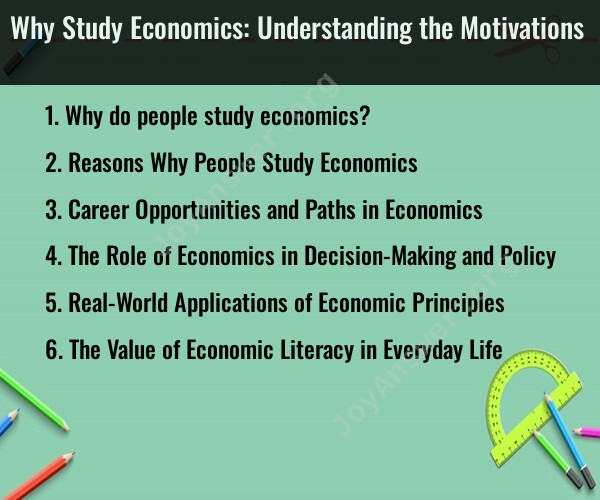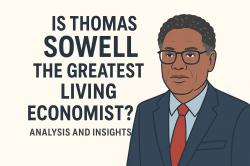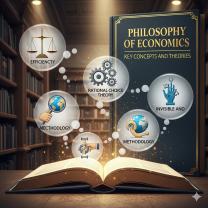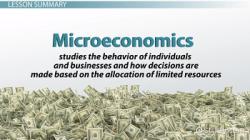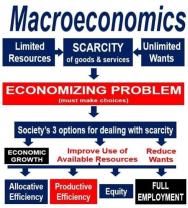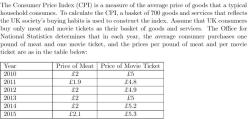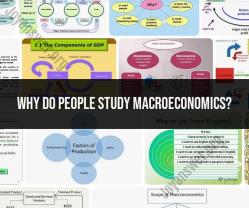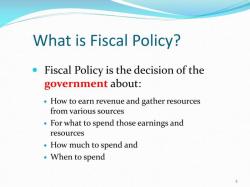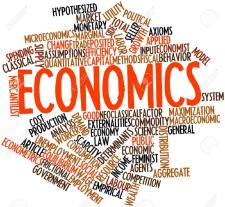Why do people study economics?
People study economics for various reasons, and their motivations can be influenced by their personal and professional goals. Here are some common motivations for studying economics:
Understanding How the Economy Works: Economics provides insights into how economies function, including the forces that drive supply and demand, price determination, and the allocation of resources. Understanding these concepts can help individuals make informed decisions in their personal and professional lives.
Career Opportunities: Many people study economics to pursue a career in economics or related fields, such as finance, banking, consulting, or government. Economics graduates are often in demand for roles in data analysis, policy analysis, and financial management.
Policy and Social Issues: Economics plays a crucial role in shaping public policy and addressing societal issues. People interested in policy-making, social justice, and international development may study economics to better understand the economic aspects of these areas.
Personal Finance and Investment: Economics knowledge is valuable for managing personal finances and making investment decisions. It helps individuals understand factors like interest rates, inflation, and risk, which are essential for financial planning.
Problem Solving: Economics is about solving real-world problems. It equips individuals with analytical and problem-solving skills that can be applied to a wide range of issues, from business decisions to global challenges.
Entrepreneurship: Entrepreneurs and business owners often study economics to gain insights into market trends, consumer behavior, and competitive strategies, which can inform business decisions and strategies.
Research and Academia: Some individuals are drawn to economics for its research and academic opportunities. They pursue advanced degrees and engage in economic research to contribute to the field's knowledge and understanding.
Global Perspective: Economics provides a global perspective on economic relationships and interdependence between nations. Studying economics can help individuals understand international trade, development, and global economic issues.
Critical Thinking: Economics encourages critical thinking and the evaluation of evidence and data. These skills are valuable not only in economics but in various other fields and aspects of life.
Personal Interest: For some, studying economics is driven by personal interest and curiosity. They enjoy exploring economic concepts and theories, even if they do not plan to pursue a career in economics.
Informed Citizenship: Understanding economics is important for informed citizenship. It enables individuals to participate in discussions about economic policies, budget decisions, and social issues with a deeper knowledge of the implications.
In summary, people study economics for a wide range of reasons, from personal interest to career aspirations and societal impact. Economics offers valuable insights into the functioning of economies at various levels, making it a versatile and relevant field of study for individuals with diverse motivations and goals.
Sure, here is a detailed explanation of the five topics you mentioned:
Reasons Why People Study Economics
Economics is the study of how individuals, societies, and governments make choices about allocating scarce resources to satisfy their wants and needs. It is a broad and multifaceted field that encompasses a wide range of topics, from microeconomics, which deals with individual decision-making, to macroeconomics, which focuses on the overall economy.
There are many reasons why people study economics. Some are interested in understanding the world around them, while others are attracted to the challenge of solving complex problems. Still others are drawn to the field for its practical applications, as economics is a valuable tool for understanding and influencing economic policy.
Here are some of the most common reasons why people study economics:
- To understand the world around them: Economics helps us understand how the economy works, why prices rise and fall, and how government policies affect our lives.
- To develop critical thinking skills: Economics teaches us to analyze data, identify cause-and-effect relationships, and make informed decisions.
- To prepare for a career in business, finance, or government: Economics is a valuable foundation for many careers, including business analyst, financial advisor, and economist.
- To make better personal financial decisions: Economics can help us understand budgeting, investing, and other financial concepts.
- To become an informed citizen: Economics helps us understand the debates surrounding economic policy and make informed choices about our government.
Career Opportunities and Paths in Economics
Economics graduates have a wide range of career opportunities, both in the public and private sectors. They can work as:
- Economists: Economists collect, analyze, and interpret economic data to forecast trends, develop economic policy, and advise businesses and governments.
- Financial analysts: Financial analysts evaluate investments, assess risks, and make investment recommendations to clients.
- Market researchers: Market researchers conduct surveys and gather data to understand consumer behavior and market trends.
- Business analysts: Business analysts study business processes and identify ways to improve efficiency and profitability.
- Policy analysts: Policy analysts evaluate the impact of government policies and recommend changes to improve outcomes.
Economics graduates can also work in a variety of other fields, such as education, law, and journalism.
The Role of Economics in Decision-Making and Policy
Economics plays a critical role in decision-making and policy at all levels, from individual households to governments. Businesses use economic principles to make decisions about production, pricing, and marketing. Governments use economic analysis to develop policies on taxation, spending, and regulation. And individuals use economic principles to make decisions about saving, investing, and spending.
Economics provides a framework for understanding the costs and benefits of different options and for predicting the likely consequences of different actions. This information can be used to make informed decisions that lead to better outcomes.
Real-World Applications of Economic Principles
Economic principles are used to understand and solve a wide range of real-world problems. Here are a few examples:
- Understanding inflation: Economists use economic models to understand the causes of inflation and to develop policies to control it.
- Reducing poverty: Economists have developed strategies for reducing poverty, such as providing access to education, healthcare, and financial services.
- Promoting economic growth: Economists study the factors that contribute to economic growth and develop policies to promote growth.
- Managing financial crises: Economists analyze financial markets and develop policies to prevent and manage financial crises.
- Protecting the environment: Economists use economic tools to evaluate the costs and benefits of environmental policies.
The Value of Economic Literacy in Everyday Life
Economic literacy is essential for making informed decisions about our personal finances, understanding the world around us, and participating in the democratic process.
Here are some of the benefits of economic literacy:
- Better personal financial decisions: Economic literacy can help us make better decisions about saving, investing, and spending.
- Informed consumer choices: Economic literacy can help us understand the principles of supply and demand, so we can make informed choices as consumers.
- Greater understanding of current events: Economic literacy can help us understand the economic news and make informed judgments about government policies.
- More effective participation in the democratic process: Economic literacy can help us make informed decisions about who to vote for and how to vote on economic issues.
In an increasingly complex world, economic literacy is more important than ever. By understanding economic principles, we can make better decisions about our lives and the world around us.
